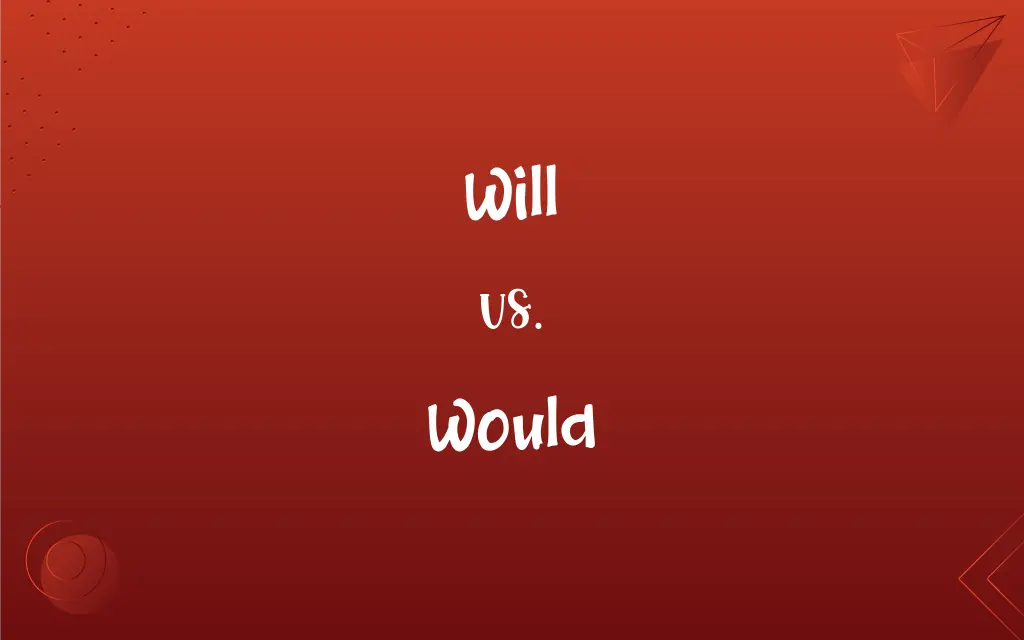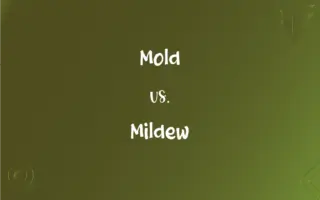Will vs. Would: What's the Difference?
Edited by Janet White || By Harlon Moss || Updated on October 14, 2023
"Will" expresses a future intention or prediction, while "would" is the past tense of "will" or expresses a conditional mood.

Key Differences
Will is primarily used to express future intentions or predictions. For instance, "I will call you tomorrow." In contrast, would is often used to indicate a condition or hypothetical situation, such as "I would call you if I had your number."
In terms of their forms, will is a modal auxiliary verb that denotes future tense. Would, on the other hand, can serve as both the past tense of "will" and a modal auxiliary verb to indicate a conditional mood or polite request.
Will is commonly used to make promises or commitments. An example could be "I will finish the task by evening." Meanwhile, would is frequently used to express polite offers or requests, like "Would you like some coffee?"
When talking about habits, will is used to refer to future habits, such as "From now on, I will exercise every day." Conversely, would can describe past habits, as in "When I was young, I would exercise every morning."
Both will and would play essential roles in English grammar. While "will" sets the stage for what is forthcoming, "would" dives into realms of past, possibility, and politeness, offering a nuanced way to express conditions and hypotheticals.
ADVERTISEMENT
Comparison Chart
Basic Use
Future tense.
Past tense or conditional mood.
Expressing Predictions
"It will rain tomorrow."
"I thought it would rain."
Making Requests
Less common; direct.
Polite; "Would you pass the salt?"
Expressing Habits
Future habits; "I will read daily."
Past habits; "I would read at the park every day."
Making Offers
Direct offers; "I will help."
Polite offers; "Would you like some help?"
ADVERTISEMENT
Will and Would Definitions
Will
A modal verb indicating the future tense.
She will arrive tomorrow.
Would
Past tense of "will".
She said she would visit.
Will
Denotes intention or prediction.
I think it will rain today.
Would
Expresses a polite request or offer.
Would you mind?
Will
Used for insistence or emphasis.
You will finish your homework.
Would
Used in conditional sentences.
I would go if I could.
Will
Indicates spontaneous decisions.
I'll get the door.
Would
Describes a past habit.
He would always laugh at that joke.
Will
Used to express determination or promise.
I will not let you down.
Would
Indicates a hypothetical situation.
That would be amazing.
Will
The mental faculty by which one deliberately chooses or decides upon a course of action
Championed freedom of will against a doctrine of predetermination.
Would
Past tense of will; usually followed by a bare infinitive.
Will
Diligent purposefulness; determination
An athlete with the will to win.
Would
Used to form the "anterior future", or "future in the past", indicating a futurity relative to a past time.
On my first day at University, I met the woman who would become my wife.
FAQs
Can "would" indicate a past event?
Yes, "would" can refer to a past event, especially in reported speech.
How does "would" express politeness?
"Would" softens requests or offers, like "Would you help me?"
Is "would" only for hypotheticals?
No, it's also for past events, politeness, and more.
When should I use "will"?
Use "will" for future actions, predictions, or decisions.
Can both "will" and "would" express habits?
Yes, "will" for future habits and "would" for past habits.
Is "will" always about the future?
Mostly, but it can also express determination or insistence.
How does "will" differ from "going to"?
Both indicate future, but "will" is often more spontaneous.
Which is more polite: "will" or "would"?
"Would" is generally considered more polite.
How is "would" used in wishes?
For present wishes about situations, like "I wish you would listen."
Can "would" be about preferences?
Yes, like "I would rather have tea."
Is "will" used in conditional sentences?
Yes, in the first conditional: "If it rains, I will stay home."
Can "would" be used in future conditions?
Yes, in second and third conditionals like "If I knew, I would tell you."
How is "will" used in reported speech?
"Will" often becomes "would": "He said he would come."
Does "would" always need a condition?
No, it can also be used for habits, requests, etc.
Can "will" express orders?
Yes, in a commanding tone: "You will do your homework now."
Is "would've" a contraction of "would have"?
Yes, it's used in conditional structures like "I would've gone if I knew."
Can "would" indicate repetition?
Yes, for past habits: "She would walk every day."
Is "will" definite?
It indicates intention or prediction, but not always certainty.
Can we use "won't" for refusal?
Yes, "won't" is the contraction of "will not" and can indicate refusal.
Does "will" show a promise?
Yes, like "I will always love you."
About Author
Written by
Harlon MossHarlon is a seasoned quality moderator and accomplished content writer for Difference Wiki. An alumnus of the prestigious University of California, he earned his degree in Computer Science. Leveraging his academic background, Harlon brings a meticulous and informed perspective to his work, ensuring content accuracy and excellence.
Edited by
Janet WhiteJanet White has been an esteemed writer and blogger for Difference Wiki. Holding a Master's degree in Science and Medical Journalism from the prestigious Boston University, she has consistently demonstrated her expertise and passion for her field. When she's not immersed in her work, Janet relishes her time exercising, delving into a good book, and cherishing moments with friends and family.































































